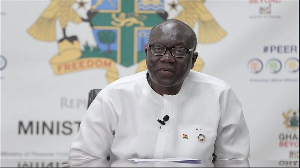Opinions of Sunday, 30 August 2015
Columnist: Albert Opare
I will tell the big six- lynching in Africa a human rights issue?
The last six decades after the Second World War has witnessed a surge in interest in human rights issues by both academicians and political leaders. This can largely be attributed to the events preceding the war and Hitler's ideas which inspired the war. Throughout history, and in most civilizations, one issue that keeps reoccurring is the issue of lynching.
The word lynch is defined by the Oxford online dictionary as "(of a group of people) kill (someone) for an alleged offence without a legal trial, especially by hanging". The word is also believed to have originated in the "mid 19th century: from Lynch's law, named after Capt. William Lynch, head of a self-constituted judicial tribunal in Virginia circa1780". (www.oxforddictionaries.com). From this definition, it is clear the act lynching is a clear violation of human rights - to deny individuals their fundamental moral entitlements (Maiese 2003).- as it relates to taking away someone's life without regard to the laws of the land. Indeed the act of lynching is also a violation of the third paragraph of the preamble of the Universal Declaration of Human Rights which states that the human rights should be protected by the rule of law. (Asare 2011). By definition lynching does not imbibe the rule of law.
As already argued, lynching seems to have been a recurrent theme in almost all civilizations and most importantly the United states of America. Quick surf on the internet shows that besides Africa, the United States is one with more stories on lynching especially about black people being lynched under segregation in the USA. Braziel (1992) for example describes what is known as the lynching era in the USA which was between 1880 and 1930 where over 2000 people are recorded to have been mobbed whilst there may even be more that is not recorded. However the point must be made that Africa ranks top in modern history. A man being lynched by soldiers and civilians in CAR. Source BBC.
The internet is awash with news and videos of lynching and attempted lynching from various African countries. As recent as 8th April, 2014, the Daily Guide Newspaper carried a story which was reproduced on the Modern Ghana news website about an alleged car snatcher who escaped lynching narrowly. The BBC internet news portal also has a story of a pastor, who was killed by a lynch mob in Nigeria on 4th February, 2014. Another news website Standard Digital in Kenya also reports that five suspected thugs were lynched in Nairobi on 5th March 2014. In Kenya also the most frequent lynch mob attacks are the ones involving witches. Ever since violence broke out in Central Africa Republic (CAR), there have also been several reported cases of lynching almost every day and that seems to be the dominant feature of the conflict. The Guardian news portal for example on 6th February, 2014 in a report states that," Even in a country where public lynching's have become a regular occurrence, it proved some acts of inhumanity still have the power to shock. Ten minutes after Catherine Samba-Panza, the interim president of the Central African Republic (CAR), addressed the army at a hopeful ceremony, some of its members broke ranks to stab, stamp and pelt a man to death, drag his corpse through the streets and set it on fire, then film it on their phones." The list goes on and on and on. Each day in some African country there is a case of lynching.
However, in almost all these countries listed above, the laws in the country have aspects that talk about the rule of law being the process for meting out justice. Indeed all these countries are also members of the United Nations and are thus bound by the Universal Declaration of Human Rights which clearly spells out the need for the rule of law. The preamble of the Ghanaian constitution for example says that Ghana is committed to the rule of law and thus if lynching takes place anywhere in the country, then it will be a clear breach of the rule of law. Indeed, Article 3 of the Universal Declaration of Human Rights states that, "Everyone has the right to life, liberty and security of person" but the act of lynching suspected criminals breaches this article clearly and with most African countries' citizens breaching this article, one can say there is a serious human right issue to be dealt with in these countries. Another article which those who lynch violate is Article 10 of the Universal Declaration of Human Rights. The article states that, "Everyone is entitled in full equality to a fair and public hearing by an independent and impartial tribunal, in the determination of his rights and obligations and any criminal charge against him." As I have argued previously almost all African countries are members of the UN and each one have accepted these declarations and ratified them in their parliaments where necessary as well as adopt portions in their own constitution, so if lynching occurs anywhere on their land, by definition, we can say that a human rights abuse is taking place.
In addition to these, one will have to avert his mind to what the causes of lynching are, as well as its effects. What quickly comes to mind when you think of the causes of lynching is the low public confidence in the security set up in the country as well as the judicial process, and this seems to be the case in most African countries. A recent survey by Transparency International called the Global Corruption Barometer indicates that this is true. The Global Corruption Barometer by the Transparency International on Ghana for the year 2013 sums up the extent of corruption in Ghana. According to report, 54% of Ghanaians feel corruption has increased over the last two years, whilst 25% say it stayed the same. 92% felt the police were corrupt and 71% felt the judiciary was corrupt. However, the most shocking amongst the revelations was that, 79% of the respondents actually reported paying bribes themselves or know of someone in their household who has paid a bribe to the police. The story is quite similar for South Africa and Kenya. In South Africa, 72% said corruption has increased while only 16% said it was the same over the last two years. The rest said it has decreased. Also, 50% said the judiciary was corrupt, 83% said the police was corrupt. In Kenya, 48% of the respondents felt corruption increased over the last two years, 22% felt it was the same, and the rest felt it decreased. 95% felt the police were corrupt, 58% felt the judiciary was corrupt and 58% and77% of the respondents conceded they had personally or a member of their household has paid a bribe to the judiciary and police respectively. (www.transparency.org)
In all the countries listed above, there is a clear indication that the perceptions of corruption in public institutions are very high and more especially in the judiciary and the police service. This leads people in resorting to taking the law into their own hands and doing as they please in their quest for justice.
The effects of lynching are also telling. Lynching causes people to leave in constant fear. As a BBC report states that an Imam called Mohammed in an interview said Muslims still in CAR live in fear of being killed by lynch mobs. (Fessy 2014). But we know from the Universal Declaration of Human Rights Article 3 that people have a right to security of person. Another related effect which comes from the fear is that it puts off foreign investors especially. This behavior sends a message to anyone who wants to come to the country for tourism or any other business that the people in the country have no respect for human rights and the rule of law, and thus they cannot be safe nor have a level playing field in the event of a misunderstanding.
The next thing I will thus look at after cataloguing this long list of events, causes and effects of lynching and its implication for human rights is the solution to the problem in Africa. The main reason why I talked about the causes, its magnitude and effects was because of the solutions I will be professing and without those it would have been difficult for my proposed solutions to be accepted wholly.
The first thing we have to do is to initiate steps to restore public confidence in both the judiciary and the police service. Looking at the high levels of perceived corruption in these countries, it will not be too absurd that people will have very low confidence in them. If corruption is also tackled, criminals will not be released after being handed over to the police without proper investigations. The perception people have about these institutions are that since they are corrupt, these criminals who they saw with 'their own eyes' stealing, are sometimes let off the hook because someone has gone to bribe them. However, this may not be entirely accurate since the police usually complain of lack of evidence and people being unwilling to testify in court. Thus once this issue about corruption or perceived corruption is addressed, people will be more willing to accept police and judiciary reasons offered for the release of suspected 'criminals'.
Another way to solve the problem of lynching is by sensitization and education. Most often those engaged in the act of lynching do not consider their act as being illegal since to them, "a thief is a thief" or "any criminal does not deserve to live". However, the Universal Declaration of Human Rights in Article 11 subsection 1 states clearly that, "Everyone charged with a penal offence has the right to be presumed innocent until proved guilty according to law in a public trial at which he has had all guarantees necessary for his defense." (Asare 2011: 201). Hence in my view, I believe sensitizing people on this provision as well as the wisdom behind this provision itself will go a long way to help reduce this. However, implementing this alone cannot solve the problem it must be done in combination with others to achieve full success especially the one with changing people's perception about law enforcement and adjudication institutions. In a place like Ghana where there is the NCCE i.e. National Commission for Civic Education, these institutions must be well funded and resourced to carry out broad-based sensitizations on this issue of lynching as well as educating people on their own rights as well as the rights of others.
Furthermore, another way to solve the problem is outright prosecution of people who engage in lynching. Almost every day we read stories in newspapers and on the internet about lynching or attempted lynching but hardly do we hear of people who lynched other people being prosecuted. If people who engage in lynching are prosecuted, I believe it will go a long way in deterring others from engaging in similar acts. Prosecution of people who lynch others will send a clear message to the African population that lynching someone is in itself a crime and a violation of that person's right to life, fair trial and a host of other rights.
A final way to solve the problem of lynching suspected criminals is also the police service improving their public relations efforts. The police can go a step further by going to communities where suspected criminals who are released for lack of evidence or other reasons to explain clearly the position of the law to the people around as well as the reasons for the person's release and if possible appeal to people to come out to testify or give evidence. This will help dispel the notion that the police are being bribed to release criminals as more people will come to get the understanding the onus lies on them if we are to take criminals off the street. There should be also incentives and confidentiality provisions made for people who decide to testify to help motivate them. The reason most people give for refusing to testify especially against armed robbers is that once they go public these people or their friends may come after them, but there are other processes of testifying in court such as through affidavits and once this message gets to people, they will feel more secure and motivated to give evidence and testify. The incentives will also help because more often than not as rational people, most people consider the time they will have to invest in going to court to testify against suspected criminals and may decide against it since it won't give them any direct benefit, but an incentive in the form of money or any other form can help solve this problem also.
To conclude, I have argued that lynching is one of the main human rights issues on the continent and it has negative implications for the countries where they are more predominant. I have also looked at some of the causes such as the low level of public confidence in the law enforcement and adjudication institutions and I have suggested some ways of dealing with the problem such as prosecution and sensitization to ensure everyone lives in peace and have security in Africa.
Until I write to you again, goodbye for now.
YOUR GRANDSON Albert Opare ahoopare@gmail.com ibelieveinghana.blogspot.com
The Author Albert Opare is a political science graduate from the University of Ghana and a social commentator as well as a social & political activist. He is also a freelance writer. You can contact the author by mail on ahoopare@gmail.com or TXT/WHATSAPP on 0575125101. Comments and Criticisms are welcome.














